Jake Sulpice
☆ There Will Be Blood
Watched on October 29, 2023
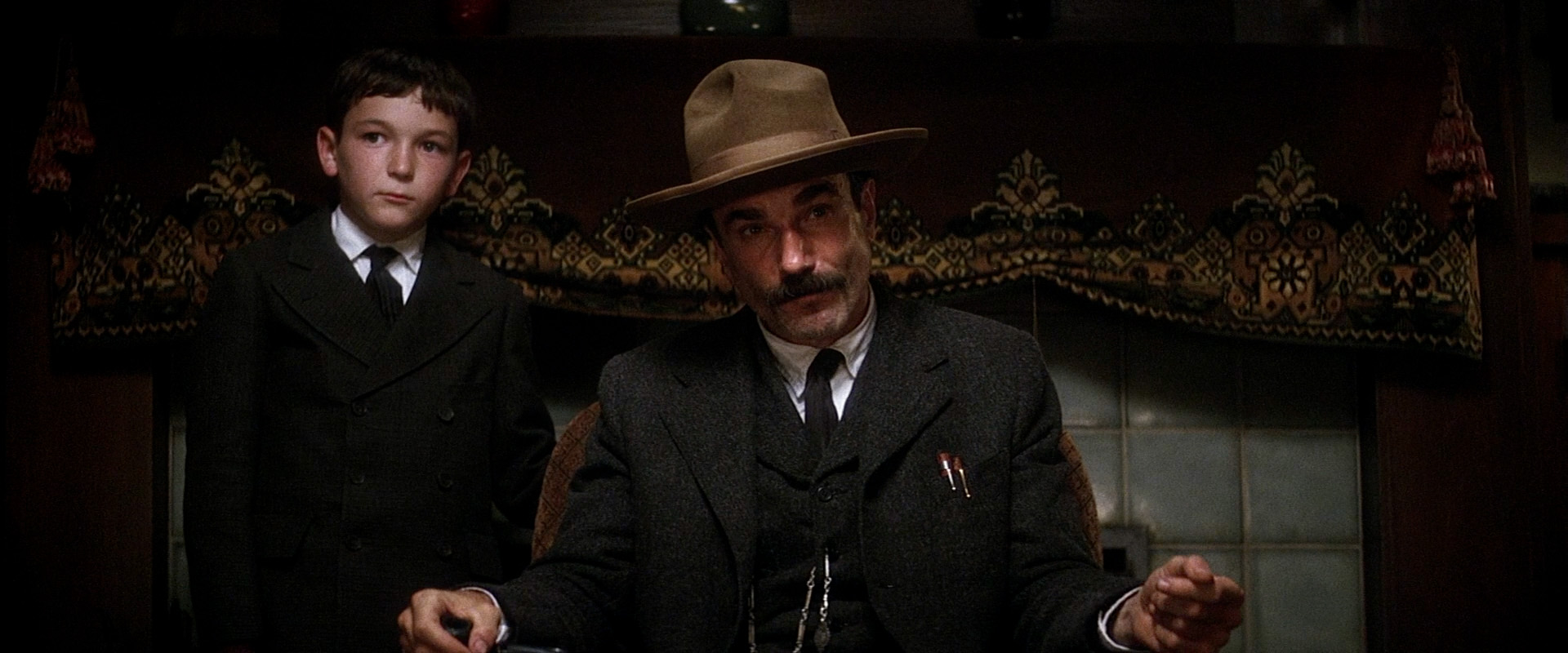
I’m a family man. I run a family business. This is my son and my partner, H.W. Plainview.
There Will Be Blood is a stark portrait of human atrocity. Daniel Plainview, a man consumed by oil and ambition, becomes a monster capable of unspeakable acts of violence and cruelty. The film is relentless in its depiction of the collateral damage of his pursuit of wealth, from the brutal killing of H.W.’s true father to the manipulation and exploitation of entire communities. The sudden and severe loss of innocence is a recurring theme, embodied in H.W.’s descent into paranoia and Daniel’s transformation from a driven entrepreneur to a haunted shell of a man.
The film is unflinching in its portrayal of violence, from the casual brutality of the oilfields to the calculated manipulation of Eli Sunday. H.W.’s deafness, a physical manifestation of the sonic trauma he experiences, reflects the loss of innocence suffered by the entire community. With its grotesque juxtaposition of childhood innocence and adult depravity, the milkshake scene stands as a haunting symbol of this loss.
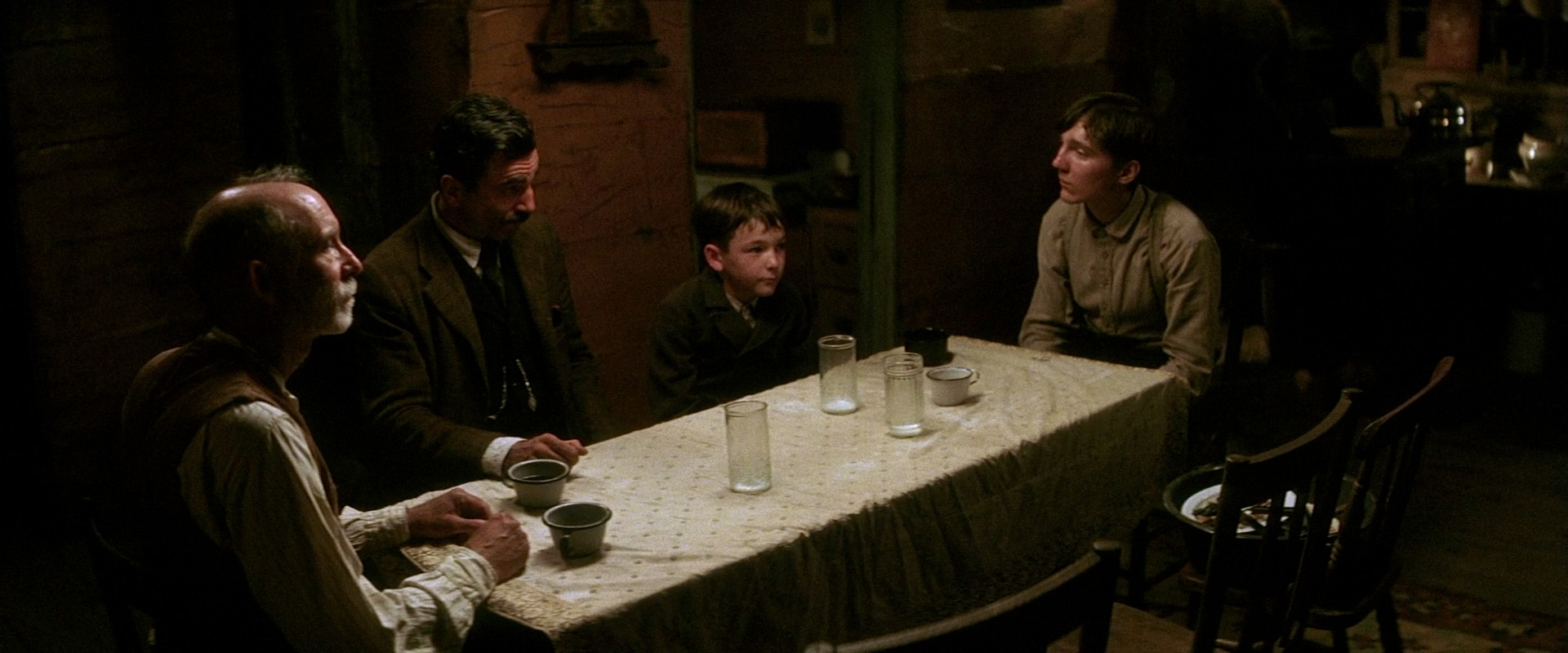
Beneath the surface of oil and ambition, the film explores the insidious nature of poisonous ideologies. Daniel’s relentless pursuit of wealth and power echoes the tenets of fascism, where the individual’s desires are paramount, even at the expense of morality and human connection. Eli Sunday’s manipulation and exploitation of faith further demonstrate this theme, preying on fear and resentment to consolidate absolute control and abundant affluence. The conflict between these two men is a microcosm of larger societal forces competing for dominance, leaving the common person caught in the crossfire.
What are you looking so miserable about? There’s a whole ocean of oil under our feet! No one can get at it except for me.
Director Paul Thomas Anderson paints a dense portrait of ambition and its corrosive touch. He doesn’t just paint the California oil boom; he baptizes us in it, immersing us in the glint of black gold and the shadows it casts. Anderson’s camera, a steel-eyed prophet, navigates landscapes parched by greed and bathed in the sickly glow of industrial furnaces. At the same time, his masterful use of symbolism adds depth and complexity to the film.
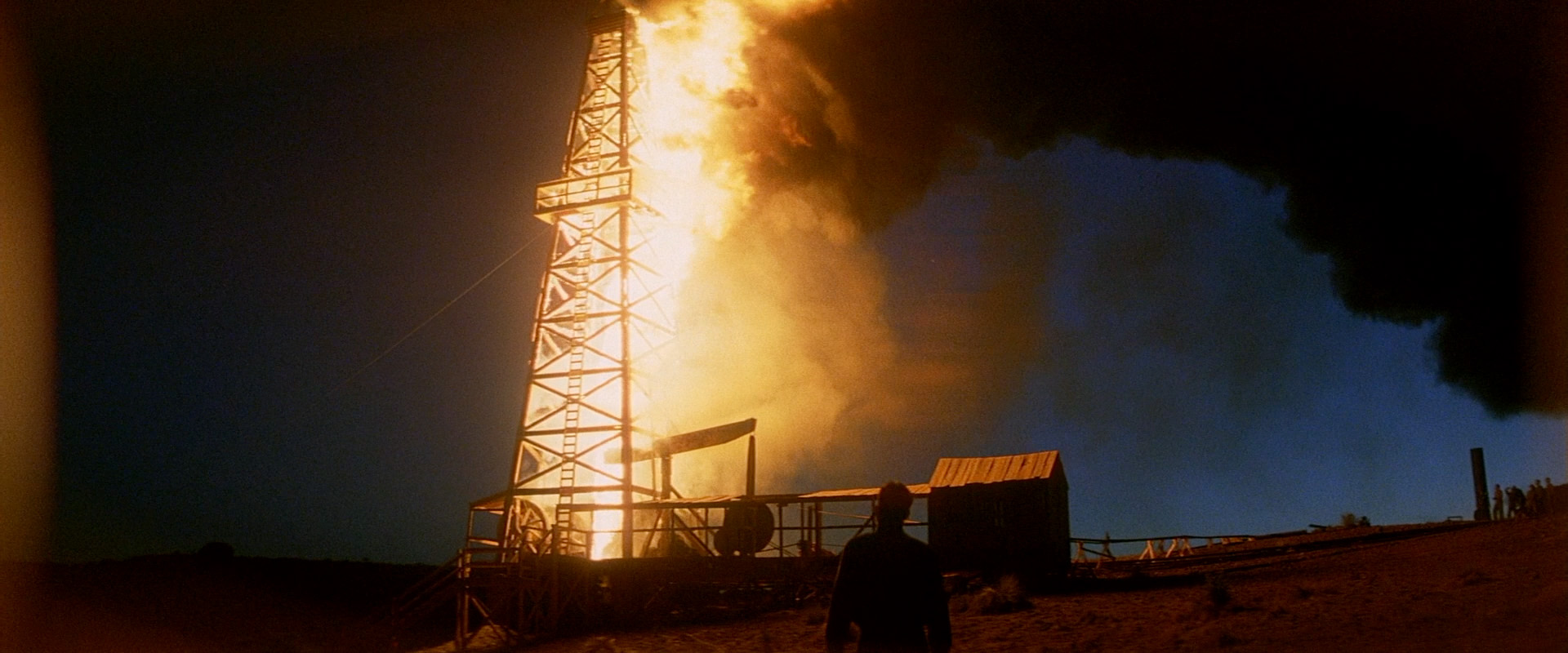
Once a symbol of prosperity, the oil becomes a black stain on the landscape and a corrosive force that consumes both the land and the souls of men. Shimmering yet viscous, the precious liquid is the film’s lifeblood, representing prosperity and corruption, a bargain that consumes souls and landscapes alike. A symbol of H.W.’s shattered innocence, the milkshake scene serves as a constant reminder of the violent trauma the young man carries. Even the bowling alley in Plainview’s mansion acts as a sterile, artificial space, highlighting the hollowness and fragility of his empire built on manipulation and lies as his rage explodes into unspeakable acts of barbarity.
Do you think God is going to save you for being stupid? He doesn’t save stupid people, Abel.
Sunlight, a rare visitor, pierces the oil-slicked earth like a spear, carving stark lines across Daniel’s rugged face. In the darkness, firelight dances like malevolent spirits, twisting shadows into ghastly silhouettes that echo the hollowness in Plainview’s soul. The cinematography is a masterclass in grit and grime, the sun a harsh mistress casting long shadows over the main character’s ruthless determination. The camera stalks him through dusty oil fields and cavernous rigs, its slow zooms mirroring his glacial descent into madness, reflecting the moral ambiguity of the characters and the setting. Wide shots dwarf him against the endless horizon, emphasizing his isolation, while claustrophobic close-ups expose the rotting wounds of his soul and the suffocating grip of his selfish desires.
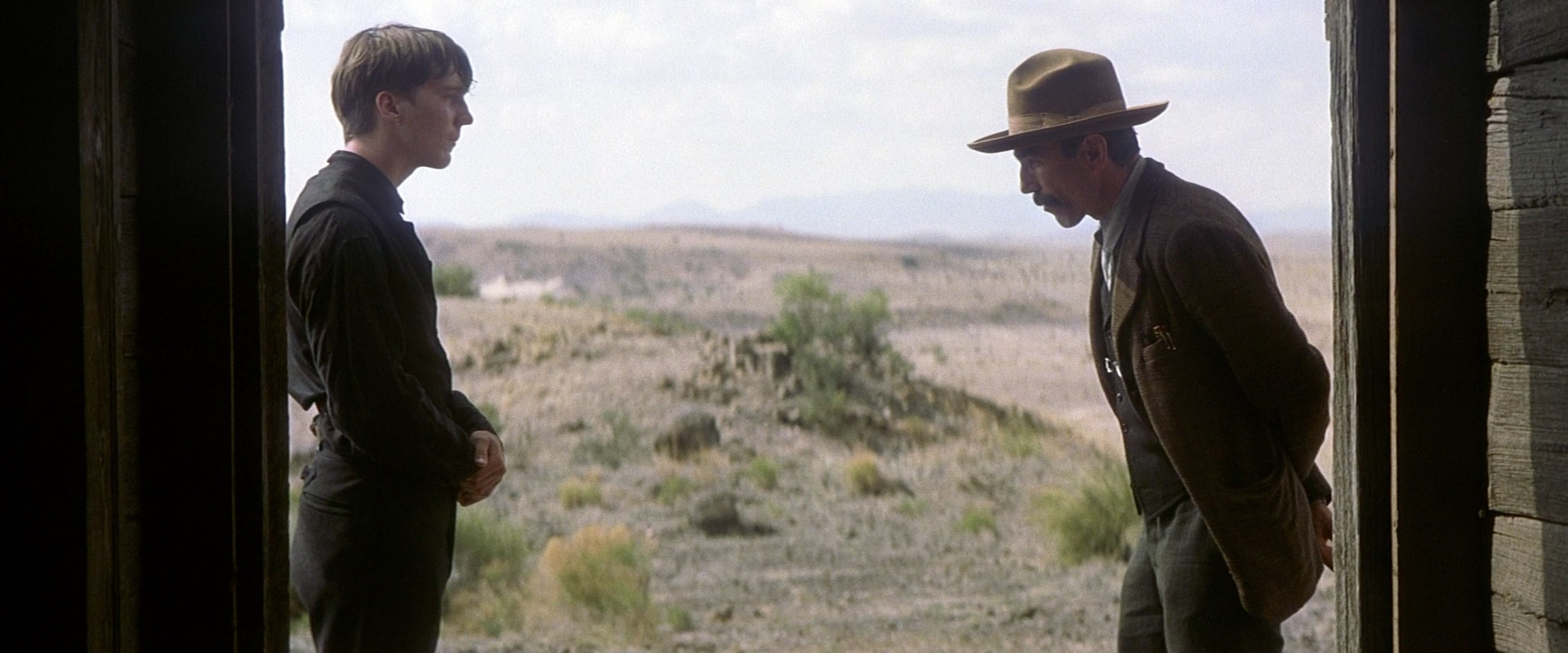
While the pacing is deliberate, the film’s plot is expertly constructed, building tension and suspense towards an inevitable and tragic climax. Daniel Plainview’s descent from a family-oriented, ambitious outsider to a ruthless tyrant is a Shakespearean tragedy, a testament to the corrosive power of unchecked ambition. From opportunistic preacher to power-hungry manipulator, Eli’s journey embodies the ease with which faith can be weaponized for personal gain. H.W.’s transformation is a haunting counterpoint to the external conflicts surrounding him, a wordless testament to the lasting scars of cruelty and loss. H.W.’s character development is particularly gripping, going from trusting son to disillusioned witness, serving as a counterpoint to Daniel’s unhinged absolutism, tangibly reflecting the consequences of unchecked impulses on those around us.
There Will Be Blood transcends its historical setting to offer commentary on morality, war, manipulation, and the enduring struggle between innocence and experience. The film’s exploration of the moral ambiguity of progress, the cost of human ambition, and the dangers of unchecked power resonate deeply in our contemporary world, rife with its conflicts and ethical quandaries. Daniel’s connections to real-world issues are not the only relationships that resonate uncomfortably close to reality; Eli’s seemingly pious exploitation of faith and the vulnerability of children mirror instances of manipulation and the importance of protecting pure innocence.
Oh, Daniel, you’ve come here, and you’ve brought good and wealth, but you have also brought your bad habits as a backslider. You’ve lusted after women, and you have abandoned your child - your child that you raised. You have abandoned all because he was sick, and you have sinned. So say it now, “I am a sinner.”
Editing choices are as brutal as Daniel’s methods. Jump cuts detonate like oil strikes, propelling us through years of ruthless pursuit. Time expands and contracts in the echoing silence between explosions, amplifying the loneliness and paranoia that fester within Plainview. Sudden cuts, like seismic tremors, erupt with violence, leaving us reeling, unsure of what ground is solid. When it appears, music is a mournful wail, a hymn for lost naivety and the souls sacrificed on the altar of oil.
The soundtrack, a mournful cello of dissonant chords, paints the air thick with uneasy discord. Dialogue is sparse, punctuated by bursts of spitting fury and mumbled prayers, painting a portrait of a world where communication has curdled into exploitation and manipulation. The wind whispers secrets through barren trees, carrying the ghosts of exhausted dreams and broken promises. Sound effects, the rhythmic whispering of derricks, and the hiss of escaping gas become a language of business, a constant reminder of the deadly seal that binds man and oil.
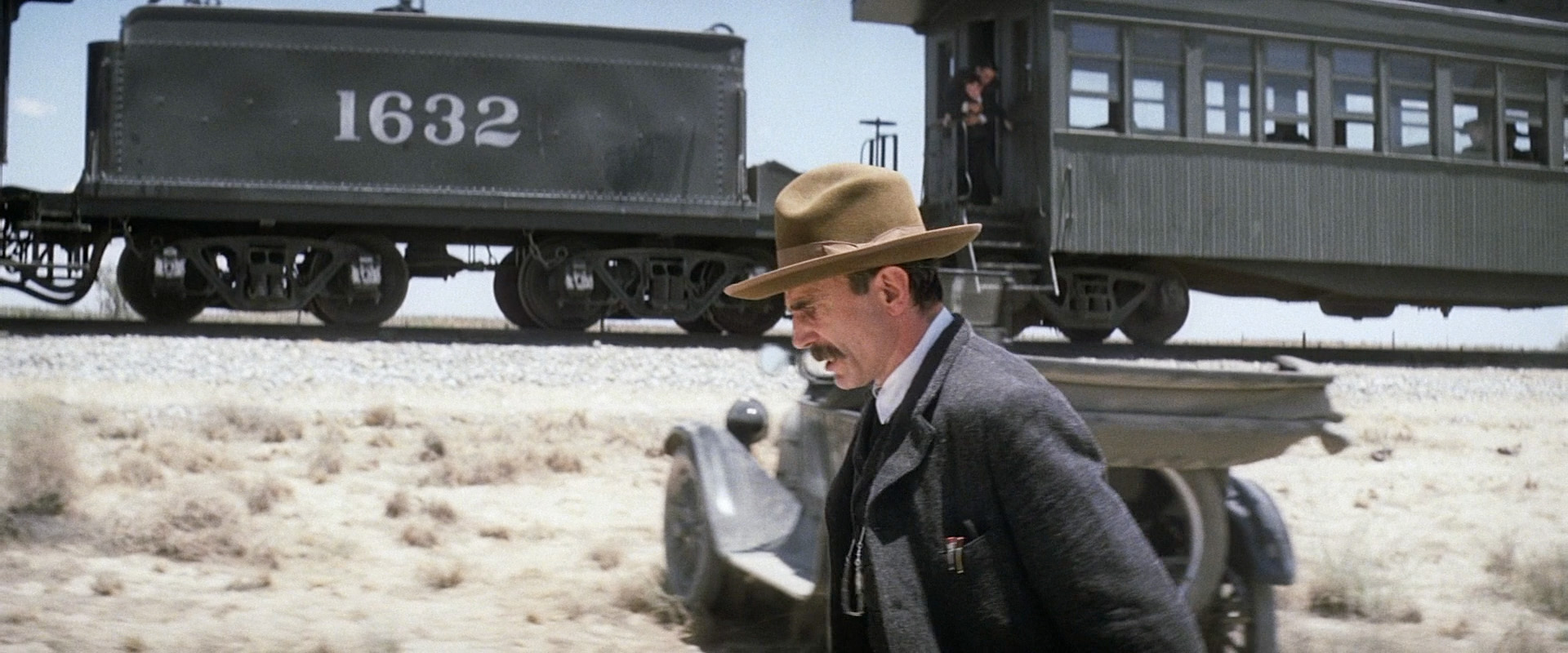
Anderson’s meticulous set design transports us to a frontier town gnawed by an eagerness to strike unfathomable riches. Oil derricks sprout like skeletal fingers from the earth, their rhythmic pumps a morbid heartbeat, the fields barren like that of Daniel’s emotional emptiness. Battered shacks huddle on the periphery, choked by dust and despair, serving as homes and places of worship for the townspeople grasping on their last straw of hope. In contrast, Plainview’s mansion, a monument to ill-gotten gains, stands as a mausoleum of his family, or what was left of it.
Mud-caked and oil-stained costumes mirror the characters’ descent into the mire. Even props, like the milkshake glass shattered against a floor, become potent symbols of fractured innocence. Daniel’s impeccably tailored suits stand out like a predator’s plumage, a constant reminder of his predatory nature.
Shut your mouth, Abel! It was your stupid son! It was Paul who told him to come here. I know it. He went to him, and he said, “My stupid, weak father will give away his lots. Go and take him.” And you let it happen.
Practical effects are not mere spectacle but visceral extensions of the narrative. Oil gushes forth like a biblical flood, swallowing men and machines whole. Fire, a recurring motif, cleanses and consumes while devouring entire landscapes, leaving only ash and the remnants of Plainview’s laughter and family values. This brutal realism isn’t a coincidence; it’s a visceral reflection of the film’s thematic core, the price of progress and the cost of enterprise.
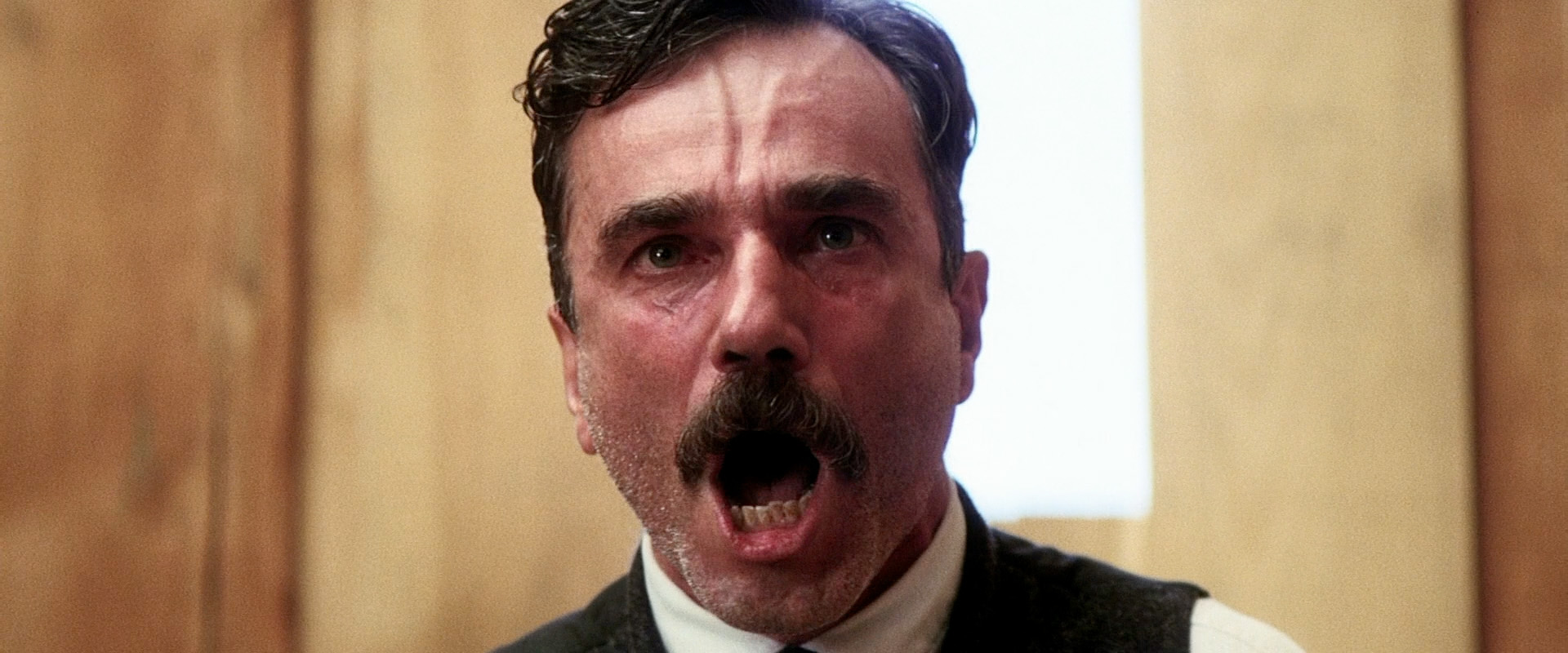
Regarding acting, you’ll likely struggle to cite a better performance in modern cinema than Daniel Day-Lewis as Daniel Plainview. The generational actor captures Plainview’s transformation from a driven businessman to a tormented husk of a man with startling intensity. Day-Lewis was seemingly born for this role, but I’m sure that can be said for many of his portrayals in other films; he genuinely is an actor’s actor. Paul Dano’s Eli Sunday is equally captivating, his youthful enthusiasm masking manipulative darkness, portraying the preacher’s duplicity with a subtle menace that is nothing short of noteworthy. Dillon Freasier, in his debut and only acting role, is a silent achievement that conveys trauma and vulnerability through movement and haunting eyes.
Drainage! Drainage, Eli, you boy. Drained dry. I’m so sorry. Here, if you have a milkshake, and I have a milkshake, and I have a straw. There it is, that’s a straw, you see? Watch it. Now, my straw reaches across the room and starts to drink your milkshake. I. Drink. Your. Milkshake!
There Will Be Blood is not a film for the faint of heart; it is a disturbing, unflinching portrait of the dark side of the American dream, where ambition curdles into atrocity and innocuousness is sacrificed on the altar of progress. It’s a commanding and thought-provoking film, a testament to the artistry of filmmaking and the enduring relevance of stories that grapple with the complexities of the human condition in a manner that doesn’t seem daunting to absorb and understand. Paul Thomas Anderson’s triumphant masterpiece leaves you shaken, breathless, and perpetually marked by its searing vision of our nation’s oil-soaked, blood-stained soul.
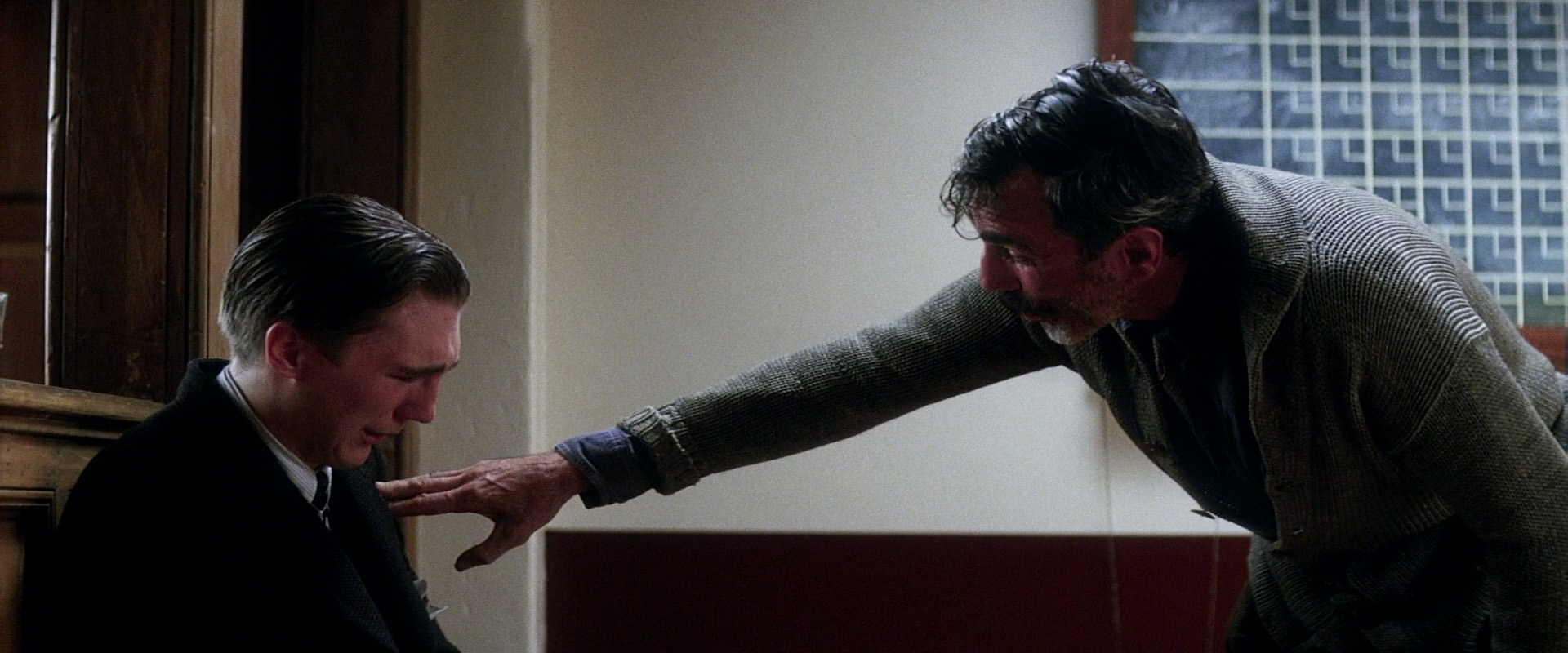
Details
- IMDB | Letterboxd
- Released in 2007
- Directed by Paul Thomas Anderson